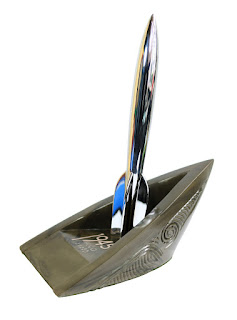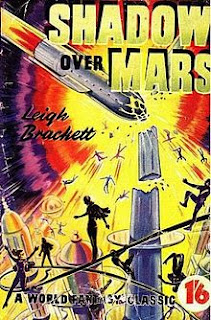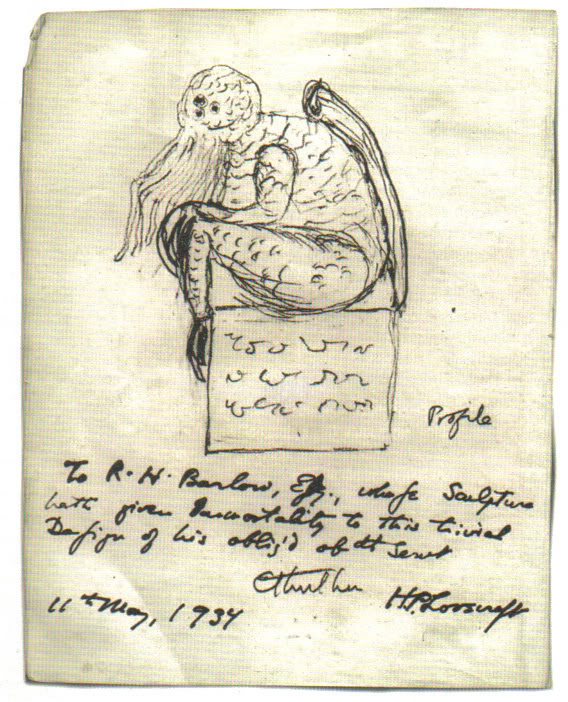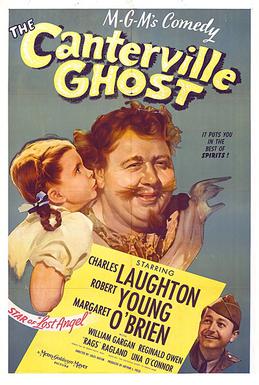Awards - The Hugo Awards 1945
The Hugo Awards for this year have been announced. But some other, older work has also been honoured. Susan Omand takes a quick look at the winners of the 1945 Hugo Awards...
As the Hugos website states, "Science Fiction has been going a lot longer that the Hugos, so many famous works never got the chance to win an Award. The WSFS Constitution gives Worldcons the right to award Hugos for a year 50, 75 or 100 years in the past, provided only that there was a Worldcon in that year but no Hugos Award election happened that year."
As the Hugos website states, "Science Fiction has been going a lot longer that the Hugos, so many famous works never got the chance to win an Award. The WSFS Constitution gives Worldcons the right to award Hugos for a year 50, 75 or 100 years in the past, provided only that there was a Worldcon in that year but no Hugos Award election happened that year."
1945 was a... shall we say... busy year for the planet with other newsworthy events obviously taking precedence, so I'm pleased that some of the creative science fiction that came out that year has now been officially recognised. Looking down the list of winners, I'm surprised by the number of author names and even book titles that I recognise too.
Even though I don't know the work of the winning author, Leigh Brackett, it was good to see both Eric Linklater and Edgar Rice Burroughs get a nomination in the Best Novel category, however I would argue that the Robert Graves novel also listed is stretching the brief a little, even though it is a cracking story.
It's also fantastic, with his centenary coming up later this month, to see Ray Bradbury's short story winning that category, in the face of very stiff competition with Simak and Asimov also in the running.
However, I'm not a fan of Lovecraft (give me Edgar Allan Poe any day) and I would have chosen any of the other Best Series nominees over the Cthulhu stories, although I understand that I am in a minority there. I may also (shock horror) have gone for one of the Flash Gordon comics over the Superman one that they chose. And what was Donald Duck doing on that list?!
What I do absolutely agree with though is the need for a tie in the films category with both The Canterville Ghost and The Curse of the Cat People being worthy winners.
And I'm well impressed that the work of artist Margaret Brundage got an award - she set the precedent in striking pulp fantasy art well before the likes of Boris Vallejo graced the walls of many a teenage bedroom in the 80s. Look up some of her work for the magazine Weird Tales here.
Talking of art, I must also say that the trophies themselves (pictured above) this year took my eye. I went digging for more info and discovered that, during the Opening Ceremony of CoNZealand, the Retro Awards base designer James Brown introduced his design with this statement:
Now in keeping with the theme of exploration, my design is based on the prow of a waka, or traditional canoe of the Māori people, the amazingly skilled navigators and explorers who were the first to discover and settle Aotearoa New Zealand. The motifs on the side are inspired by whakairo, the traditional Māori art of wood carving.
In the spirit of the Retro Hugos, I think it’s ideal that the award itself can give a sense of being an artifact from the year that it honours. Design-wise, the mid-1940s were a really interesting time in between the sleek modernism of art deco and the futurism of the 1950s. A lot of creative use was being made of new polymers and plastics. So I chose to cast the base in a polyurethane resin with a marbled effect, reminiscent of art deco bakelite radios, and I’ve given the lettering an imitation mother of pearl effect with an iridescent, translucent resin. The design of the lettering was inspired by the typography of golden age sci-fi magazine covers.
This was an immensely fun project for me to work on. I got to use all sorts of techniques which were new to me, like computer aided design and 3D printing, and my background as a sculptor is in the miniature war-gaming industry so this is by far the largest thing I’ve ever sculpted and cast.
It’s been quite a long project, quite a long process, especially with the unexpected demands of the COVID-19 lockdown, but fortunately my wife has been very understanding and hasn’t minded me turning our relatively small apartment into my workshop. I’m really grateful to the committee for choosing my design, and I hope that I’ve created a trophy that lives up to the excellence of the work of writers that are honoured.
The full list of 1945 winners (and other nominees) is below but, if you're a stats nerd like me, you'll also enjoy reading Full Nominating and Final Ballot Voting Details (PDF) and, in addition to the official statistics, Nicholas Whyte, a member of the 2020 Hugo Awards Administration Subcommittee, provided additional analysis of the results.
Best Novel
** WINNER ** “Shadow Over Mars” (The Nemesis from Terra), by Leigh Brackett (Startling Stories, Fall 1944)
The Golden Fleece (Hercules, My Shipmate), by Robert Graves (Cassell)
Sirius: A Fantasy of Love and Discord, by Olaf Stapledon (Secker & Warburg)
“The Winged Man”, by A.E. van Vogt and E. Mayne Hull (Astounding Science Fiction, May-June 1944)
Land of Terror, by Edgar Rice Burroughs (Edgar Rice Burroughs, Inc.)
The Wind on the Moon, by Eric Linklater (Macmillan)
Best Novella
** WINNER ** “Killdozer!”, by Theodore Sturgeon (Astounding Science Fiction, November 1944)
“The Jewel of Bas”, by Leigh Brackett (Planet Stories, Spring 1944)
“The Changeling”, by A.E. van Vogt (Astounding Science Fiction, April 1944)
“Trog”, by Murray Leinster (Astounding Science Fiction, June 1944)
“A God Named Kroo”, by Henry Kuttner (Thrilling Wonder Stories, Winter 1944)
“Intruders from the Stars”, by Ross Rocklynne (Amazing Stories, January 1944)
Best Novelette
** WINNER ** “City”, by Clifford D. Simak (Astounding Science Fiction, May 1944)
“No Woman Born”, by C.L. Moore (Astounding Science Fiction, December 1944)
“Arena”, by Fredric Brown (Astounding Science Fiction, June 1944)
“When the Bough Breaks”, by Lewis Padgett (C.L. Moore and Henry Kuttner) (Astounding Science Fiction, November 1944)
“The Big and the Little” (“The Merchant Princes”), by Isaac Asimov (Astounding Science Fiction, August 1944)
“The Children’s Hour”, by Lawrence O’Donnell (C.L. Moore and Henry Kuttner) (Astounding Science Fiction, March 1944)
Note: “The Big and the Little” and “The Children’s Hour" tied for fifth place.
Best Short Story
** WINNER ** “I, Rocket”, by Ray Bradbury (Amazing Stories, May 1944)
“Desertion”, by Clifford D. Simak (Astounding Science Fiction, November 1944)
“Huddling Place”, by Clifford D. Simak (Astounding Science Fiction, July 1944)
“The Wedge” (“The Traders”), by Isaac Asimov (Astounding Science Fiction, October 1944)
“And the Gods Laughed”, by Fredric Brown (Planet Stories, Spring 1944)
“Far Centaurus”, by A. E. van Vogt (Astounding Science Fiction, January 1944)
** WINNER ** The Cthulhu Mythos, by H. P. Lovecraft, August Derleth, and others
Pellucidar, by Edgar Rice Burroughs
Doc Savage, by Kenneth Robeson/Lester Dent
The Shadow, by Maxwell Grant (Walter B. Gibson)
Captain Future, by Brett Sterling (Edmond Hamilton)
Jules de Grandin, by Seabury Quinn
Best Related Work
** WINNER ** “The Science-Fiction Field”, by Leigh Brackett (Writer’s Digest, July 1944)
Fancyclopedia, by Jack Speer (Forrest J. Ackerman)
“The Works of H.P. Lovecraft: Suggestions for a Critical Appraisal”, by Fritz Leiber (The Acolyte, Fall 1944)
Rockets: The Future of Travel Beyond the Stratosphere, by Willy Ley (Viking Press)
Mr. Tompkins Explores the Atom, by George Gamow (Cambridge University Press)
’42 To ’44: A Contemporary Memoir Upon Human Behavior During the Crisis of the World Revolution, by H.G. Wells (Secker & Warburg)
Best Graphic Story or Comic
** WINNER ** Superman: “The Mysterious Mr. Mxyztplk”, by Jerry Siegel and Joe Shuster (Detective Comics, Inc.)
Donald Duck: “The Mad Chemist”, by Carl Barks (Dell Comics)
The Spirit: “For the Love of Clara Defoe”, by Manly Wade Wellman, Lou Fine and Don Komisarow (Register and Tribune Syndicate)
Buck Rogers: “Hollow Planetoid”, by Dick Calkins (National Newspaper Service)
Flash Gordon: “Battle for Tropica”, by Don Moore and Alex Raymond (King Features Syndicate)
Flash Gordon: “Triumph in Tropica”, by Don Moore and Alex Raymond (King Features Syndicate)
** WINNER ** John W. Campbell, Jr.
Dorothy McIlwraith
Mary Gnaedinger
Raymond A. Palmer
Oscar J. Friend
W. Scott Peacock
Best Professional Artist
** WINNER ** Margaret Brundage
Earle K. Bergey
Boris Dolgov
Paul Orban
William Timmins
Matt Fox
Best Fanzine
** WINNER ** Voice of the Imagi-Nation, edited by Forrest J. Ackerman and Myrtle R. Douglas
Le Zombie, edited by Bob Tucker and E.E. Evans
Futurian War Digest, edited by J. Michael Rosenblum
The Acolyte, edited by Francis T. Laney and Samuel D. Russell
Shangri L’Affaires, edited by Charles Burbee
Diablerie, edited by Bill Watson
Best Fan Writer
** WINNER ** Fritz Leiber
Bob Tucker
Morojo/Myrtle R. Douglas
Jack Speer
Harry Warner, Jr.
J. Michael Rosenblum
Top image and design statement courtesy of File 770 and CoNZealand Promotions/Press Office. Permission for non-commercial and journalistic uses with attribution granted.
Talking of art, I must also say that the trophies themselves (pictured above) this year took my eye. I went digging for more info and discovered that, during the Opening Ceremony of CoNZealand, the Retro Awards base designer James Brown introduced his design with this statement:
Now in keeping with the theme of exploration, my design is based on the prow of a waka, or traditional canoe of the Māori people, the amazingly skilled navigators and explorers who were the first to discover and settle Aotearoa New Zealand. The motifs on the side are inspired by whakairo, the traditional Māori art of wood carving.
In the spirit of the Retro Hugos, I think it’s ideal that the award itself can give a sense of being an artifact from the year that it honours. Design-wise, the mid-1940s were a really interesting time in between the sleek modernism of art deco and the futurism of the 1950s. A lot of creative use was being made of new polymers and plastics. So I chose to cast the base in a polyurethane resin with a marbled effect, reminiscent of art deco bakelite radios, and I’ve given the lettering an imitation mother of pearl effect with an iridescent, translucent resin. The design of the lettering was inspired by the typography of golden age sci-fi magazine covers.
This was an immensely fun project for me to work on. I got to use all sorts of techniques which were new to me, like computer aided design and 3D printing, and my background as a sculptor is in the miniature war-gaming industry so this is by far the largest thing I’ve ever sculpted and cast.
It’s been quite a long project, quite a long process, especially with the unexpected demands of the COVID-19 lockdown, but fortunately my wife has been very understanding and hasn’t minded me turning our relatively small apartment into my workshop. I’m really grateful to the committee for choosing my design, and I hope that I’ve created a trophy that lives up to the excellence of the work of writers that are honoured.
The full list of 1945 winners (and other nominees) is below but, if you're a stats nerd like me, you'll also enjoy reading Full Nominating and Final Ballot Voting Details (PDF) and, in addition to the official statistics, Nicholas Whyte, a member of the 2020 Hugo Awards Administration Subcommittee, provided additional analysis of the results.
Best Novel
** WINNER ** “Shadow Over Mars” (The Nemesis from Terra), by Leigh Brackett (Startling Stories, Fall 1944)
The Golden Fleece (Hercules, My Shipmate), by Robert Graves (Cassell)
Sirius: A Fantasy of Love and Discord, by Olaf Stapledon (Secker & Warburg)
“The Winged Man”, by A.E. van Vogt and E. Mayne Hull (Astounding Science Fiction, May-June 1944)
Land of Terror, by Edgar Rice Burroughs (Edgar Rice Burroughs, Inc.)
The Wind on the Moon, by Eric Linklater (Macmillan)
Best Novella
** WINNER ** “Killdozer!”, by Theodore Sturgeon (Astounding Science Fiction, November 1944)
“The Jewel of Bas”, by Leigh Brackett (Planet Stories, Spring 1944)
“The Changeling”, by A.E. van Vogt (Astounding Science Fiction, April 1944)
“Trog”, by Murray Leinster (Astounding Science Fiction, June 1944)
“A God Named Kroo”, by Henry Kuttner (Thrilling Wonder Stories, Winter 1944)
“Intruders from the Stars”, by Ross Rocklynne (Amazing Stories, January 1944)
Best Novelette
** WINNER ** “City”, by Clifford D. Simak (Astounding Science Fiction, May 1944)
“No Woman Born”, by C.L. Moore (Astounding Science Fiction, December 1944)
“Arena”, by Fredric Brown (Astounding Science Fiction, June 1944)
“When the Bough Breaks”, by Lewis Padgett (C.L. Moore and Henry Kuttner) (Astounding Science Fiction, November 1944)
“The Big and the Little” (“The Merchant Princes”), by Isaac Asimov (Astounding Science Fiction, August 1944)
“The Children’s Hour”, by Lawrence O’Donnell (C.L. Moore and Henry Kuttner) (Astounding Science Fiction, March 1944)
Note: “The Big and the Little” and “The Children’s Hour" tied for fifth place.
Best Short Story
** WINNER ** “I, Rocket”, by Ray Bradbury (Amazing Stories, May 1944)
“Desertion”, by Clifford D. Simak (Astounding Science Fiction, November 1944)
“Huddling Place”, by Clifford D. Simak (Astounding Science Fiction, July 1944)
“The Wedge” (“The Traders”), by Isaac Asimov (Astounding Science Fiction, October 1944)
“And the Gods Laughed”, by Fredric Brown (Planet Stories, Spring 1944)
“Far Centaurus”, by A. E. van Vogt (Astounding Science Fiction, January 1944)
Best Series
** WINNER ** The Cthulhu Mythos, by H. P. Lovecraft, August Derleth, and others
Pellucidar, by Edgar Rice Burroughs
Doc Savage, by Kenneth Robeson/Lester Dent
The Shadow, by Maxwell Grant (Walter B. Gibson)
Captain Future, by Brett Sterling (Edmond Hamilton)
Jules de Grandin, by Seabury Quinn
Best Related Work
** WINNER ** “The Science-Fiction Field”, by Leigh Brackett (Writer’s Digest, July 1944)
Fancyclopedia, by Jack Speer (Forrest J. Ackerman)
“The Works of H.P. Lovecraft: Suggestions for a Critical Appraisal”, by Fritz Leiber (The Acolyte, Fall 1944)
Rockets: The Future of Travel Beyond the Stratosphere, by Willy Ley (Viking Press)
Mr. Tompkins Explores the Atom, by George Gamow (Cambridge University Press)
’42 To ’44: A Contemporary Memoir Upon Human Behavior During the Crisis of the World Revolution, by H.G. Wells (Secker & Warburg)
Best Graphic Story or Comic
** WINNER ** Superman: “The Mysterious Mr. Mxyztplk”, by Jerry Siegel and Joe Shuster (Detective Comics, Inc.)
Donald Duck: “The Mad Chemist”, by Carl Barks (Dell Comics)
The Spirit: “For the Love of Clara Defoe”, by Manly Wade Wellman, Lou Fine and Don Komisarow (Register and Tribune Syndicate)
Buck Rogers: “Hollow Planetoid”, by Dick Calkins (National Newspaper Service)
Flash Gordon: “Battle for Tropica”, by Don Moore and Alex Raymond (King Features Syndicate)
Flash Gordon: “Triumph in Tropica”, by Don Moore and Alex Raymond (King Features Syndicate)
Best Dramatic Presentation, Short Form
** JOINT WINNER ** (tie) The Canterville Ghost, screenplay by Edwin Harvey Blum from a story by Oscar Wilde, directed by Jules Dassin (Metro-Goldwyn-Mayer (MGM))
** JOINT WINNER ** (tie) The Curse of the Cat People, written by DeWitt Bodeen, directed by Gunther V. Fritsch and Robert Wise (RKO Radio Pictures)
Donovan’s Brain, adapted by Robert L. Richards from a story by Curt Siodmak, producer, director and editor William Spier (CBS Radio Network)
It Happened Tomorrow, screenplay and adaptation by Dudley Nichols and René Clair, directed by René Clair (Arnold Pressburger Films)
House of Frankenstein, screenplay by Edward T. Lowe, Jr. from a story by Curt Siodmak, directed by Erle C. Kenton (Universal Pictures)
The Invisible Man’s Revenge, written by Bertram Millhauser, directed by Ford Beebe (Universal Pictures)
Best Editor, Short Form
** JOINT WINNER ** (tie) The Curse of the Cat People, written by DeWitt Bodeen, directed by Gunther V. Fritsch and Robert Wise (RKO Radio Pictures)
Donovan’s Brain, adapted by Robert L. Richards from a story by Curt Siodmak, producer, director and editor William Spier (CBS Radio Network)
It Happened Tomorrow, screenplay and adaptation by Dudley Nichols and René Clair, directed by René Clair (Arnold Pressburger Films)
House of Frankenstein, screenplay by Edward T. Lowe, Jr. from a story by Curt Siodmak, directed by Erle C. Kenton (Universal Pictures)
The Invisible Man’s Revenge, written by Bertram Millhauser, directed by Ford Beebe (Universal Pictures)
Best Editor, Short Form
** WINNER ** John W. Campbell, Jr.
Dorothy McIlwraith
Mary Gnaedinger
Raymond A. Palmer
Oscar J. Friend
W. Scott Peacock
Best Professional Artist
** WINNER ** Margaret Brundage
Earle K. Bergey
Boris Dolgov
Paul Orban
William Timmins
Matt Fox
Best Fanzine
** WINNER ** Voice of the Imagi-Nation, edited by Forrest J. Ackerman and Myrtle R. Douglas
Le Zombie, edited by Bob Tucker and E.E. Evans
Futurian War Digest, edited by J. Michael Rosenblum
The Acolyte, edited by Francis T. Laney and Samuel D. Russell
Shangri L’Affaires, edited by Charles Burbee
Diablerie, edited by Bill Watson
Best Fan Writer
** WINNER ** Fritz Leiber
Bob Tucker
Morojo/Myrtle R. Douglas
Jack Speer
Harry Warner, Jr.
J. Michael Rosenblum
Images - Wikipedia









Post a Comment